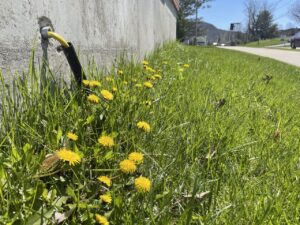Spring allergies are not just the sniffles

Having settled into her usual world literature class, professor Flo Keyes delivered her lecture like she would on any other day.
Out of nowhere, Keyes slightly tensed up.
“Excuse me,” she said suddenly, walking hastily in the direction of the door.
She exited the room, leaving all of the students to look at each other with puzzled expressions.
Keyes’ exit was promptly followed with a flurry of coughs before returning to the classroom.
“I promise I don’t have COVID. If I did, I would be at home,” she frantically apologized. “It’s just my allergies.”
Keyes, like many other people, suffers from the annual day-to-day struggle of spring allergies. Not everybody has the misfortune of dealing with them leading many to believe it isn’t a big deal, or it’s just the ‘sniffles,’ but the list of symptoms is long.
“For me it starts with a stuffy nose on the left side, to both sides, to runny nose, then post nasal drip,” said Castleton junior Michael Martin. Post nasal drip, which Martin says he experiences, is one of the most overlooked symptoms of spring allergies.
Spoiler alert – it isn’t fun.
Post nasal drip is when you have a runny nose, only it’s running backwards.
“It means it’s going down the back of my throat and irritating my tonsils,” said Patrick Dixon, a junior nursing student at Castleton.
This creates a tickly feeling in your throat that you can’t clear out without coughing, or if you’re in public, causing a scene.
Like Martin, Dixon also experiences a progression of “a lot of congestion, then a lot of runny nose bullshit,” Dixon said.
If you’re wondering if allergies are a distraction in class, they “100% are,” Dixon said.
“It’s awkward. You don’t wanna be that person that’s sniffling and sneezing in class, because then everyone just involuntarily moves to the side,” Dixon added.
To make matters worse, until recently we’ve all had to sit in class with stupid fabrics over our faces, which can be even more annoying for allergy sufferers.
“When we had the masks, it was distracting because I felt like I couldn’t blow my nose, and it would just run and sit in my mask,” Martin said.
It sounds gross because it is, folks.
Just like how allergies distract students in class, they also have quite the impact on the ones leading the class.
“I get Itchy eyes, weepy eyes and the feeling in the back of your head that it’s about to explode because your sinuses are three-times the size they ought to be,” Keyes said. “I’ve also had fall allergies to the point where my eyes swell shut,” Keyes added.
Unfortunately, many allergy symptoms reflect the signs of COVID-19. Because of this, many are forced to adapt to the stigma of coughing and sneezing.
“At my job, if you were to sneeze, then people would look at you like you had a deadly weapon,” Martin said.
Keyes even had to go so far as to alter the way she held herself in front of her students.
“I started my classes by telling everyone I had seasonal allergies, and that I actually didn’t have COVID,” Keyes said. “People think ‘oh you’re sneezing, you’re coughing, you’ve got a sore throat, can I get away from you?’”
Media and Communication professor Stephanie Wilson has also had countless tales of allergies impacting her teaching ability.
“It makes you self-conscious if you’re sneezing or your voice doesn’t sound normal. Like right now my voice sounds very froggy and gurgly,” Wilson said.
Wilson has a love-hate relationship with masks, as she actually finds value in wearing masks as a method of protection against the storm of pollen.
“Around this time of the year you can see the pollen gets like an inch thick and sticks to anything outside,” Wilson said. “Masks can also help hide your red, running nose,” Wilson added with a laugh.
She also mentioned, however, “there’s nothing worse than sneezing when you’re wearing a mask.”
Wilson also struggles with an auto-immune disorder, meaning when her allergies get really bad, it makes her other conditions feel that much worse.
“It’s a state of inflammation in your body, so it can really affect other things going on in your body as well,” Wilson said.
The Wellness Center at Castleton is well aware of seasonal allergies too.
“It is a significant problem for people to have to deal with,” said Sandy Brutkoski, a registered nurse at the center. “It’s something you have to get through, and you have to know your body well enough so it doesn’t cause other issues like sinus infections.”
Brutkoski added that there is generally an increase in traffic through the Wellness Center in the spring months, although there isn’t data to support it.
Brutkoski also listed off an array of preventative measures to help fight off the pesky allergy symptoms. This list includes staying hydrated and exercising as general healthy habits as well as subjecting yourself to humidity while avoiding other things you might be allergic to, such as animals.

“There are natural ingredients in teas, and things like echinacea that are good and can boost your immune system, as well as eating fruits and veggies,” Brutkoski said.
Dixon stresses the importance of bringing cough drops with him to class.
“Even when my throat isn’t that sore, a lot of times I’ll bring cough drops just to make sure I don’t cough and be a distraction,” Dixon said.
Martin, on the other hand, takes a more militaristic approach to handling his allergies.
“I just pop a Zyrtec and go on with my day,” Martin said.
Wilson said she has tried just about everything she can get her hands on to try and alleviate her allergies.
“I have an arsenal of different things that I’ve tried over the years,” she said.
Keyes has actually gotten frustrated with pharmacies over their distribution of cold and allergy relieving medicines
“The primary non-drowsy medicine is pseudoephedrine, and it requires two forms of ID, and sometimes I haven’t been able to adequately prove that I was me,” Keyes said.
The reason for the required ID is because the medicine is also the primary ingredient in manufacturing meth.
“I’m such a good drug manufacturer, right? I don’t even know what it makes, and yet they won’t sell it to me,” Keyes complained. “You aren’t usually thinking of the two forms of ID when you’re sneezing your face off and you just want something to make it stop,” Keyes said.
Perhaps the biggest struggle of an allergy sufferer is the misunderstanding on the part of a non-allergy sufferer.
“My parents were both nurses, so they understood, and they were just like ‘here, take this and if you don’t, then don’t complain,’ and basically at that point you’re choosing to suffer,” Dixon said.
Wilson’s husband has become used to her allergic symptoms, but she can’t say the same about everybody.
“It’s something that not everybody understands. It’s not just the sniffles,” Wilson said.








